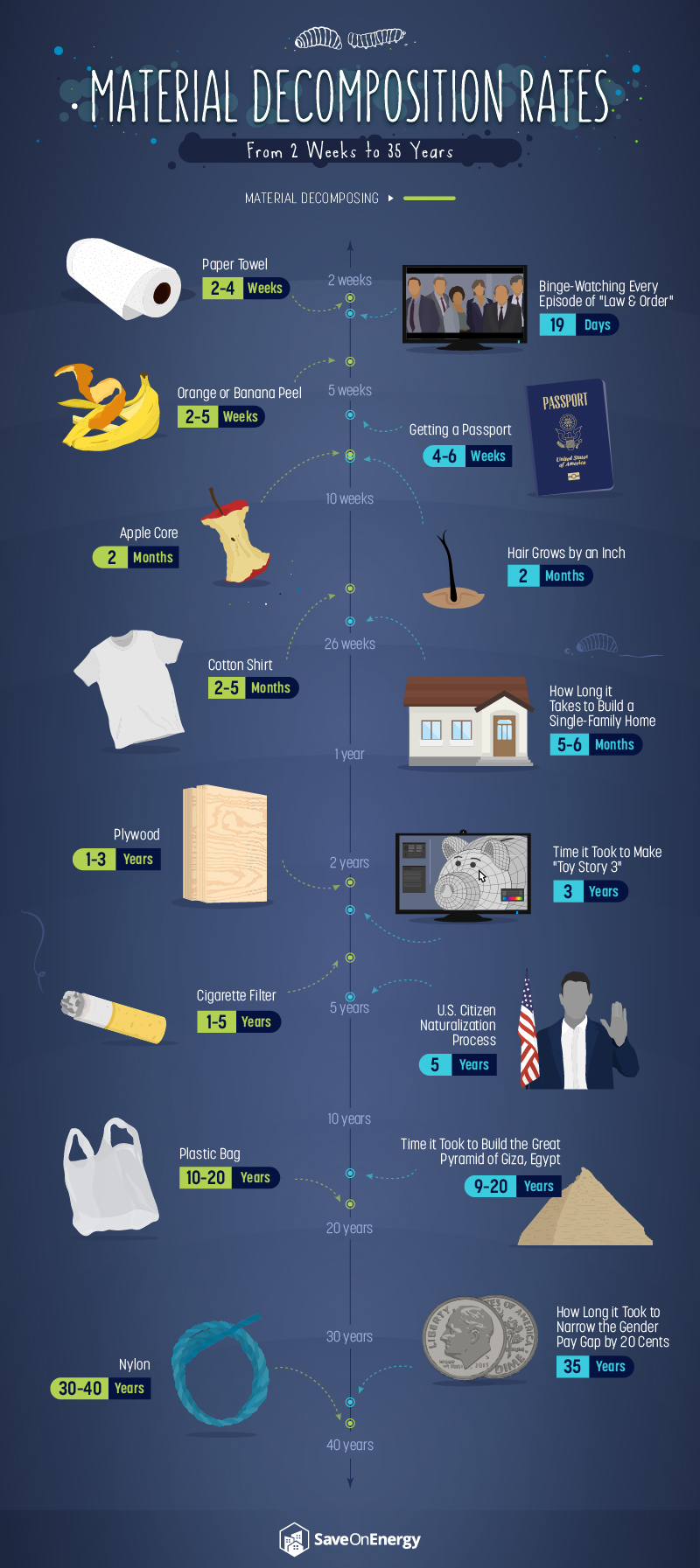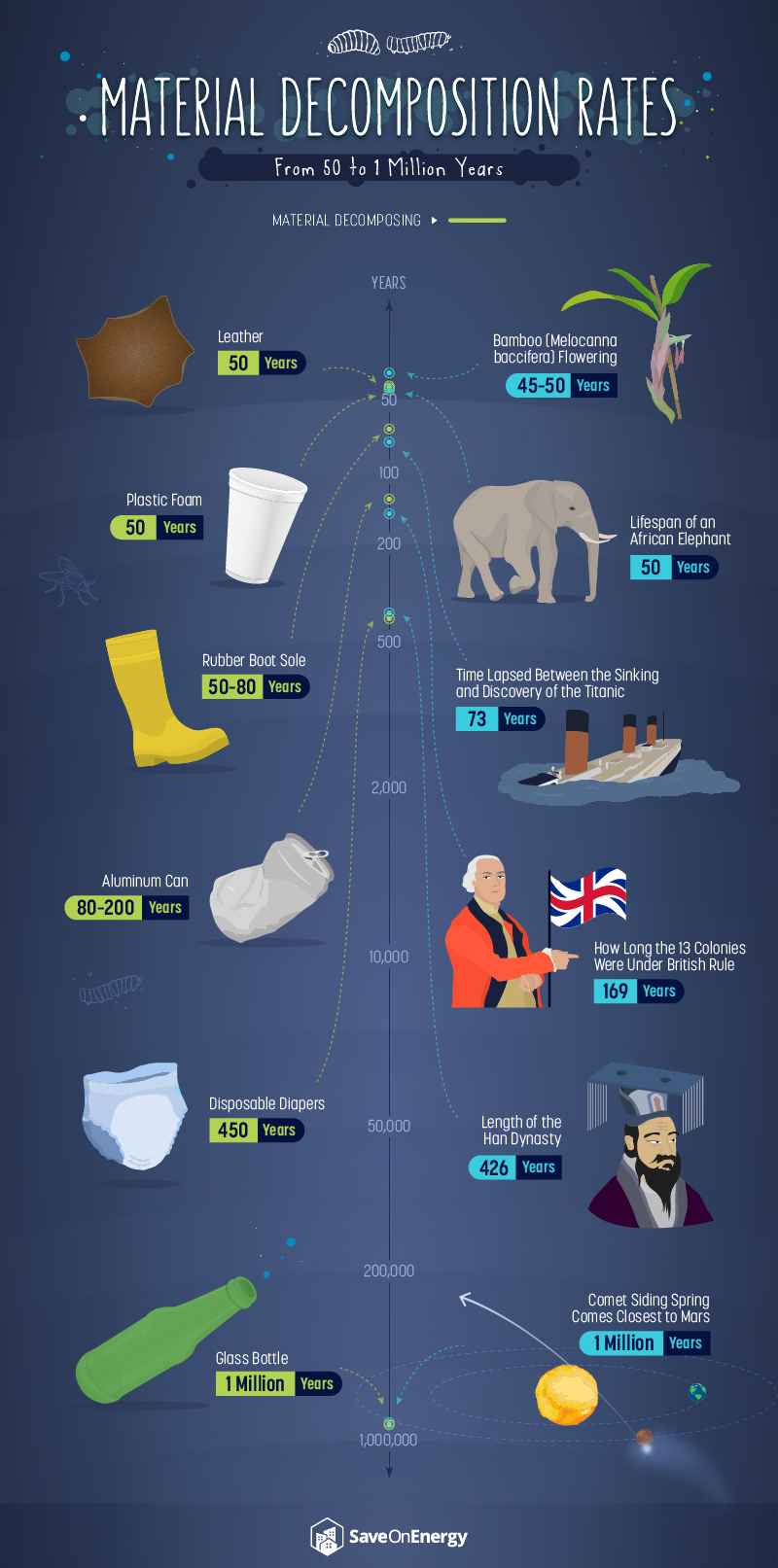
Americans generate over 4 pounds of waste per person every day, totaling more than 220 million tons of trash each year – a majority of which gets sorted and sent to landfills.
With more than 3,500 landfills across the country, these dumps create the second largest source of human-related methane emissions in the country. Unfortunately, that number has continued to grow over time, and methane has the potential to trap heat in the atmosphere 25 times more effectively than carbon dioxide.
What really happens to the trash we send away, and how long does it take discarded items to decompose once they’ve been tossed out? We studied everything from paper towels and banana peels to plastic bags and disposable diapers. If you’re curious to know how long your 4 pounds of daily trash will take up space in our landfills, explore how much trash is near your home and keep reading.
Timing the Trash in Our Landfills

Think about how many paper towels you use every day, or even how many you might grab at one time to help clean up a mess. Every single one of those paper towels takes two weeks to a month to fully decompose from the time you toss it into the bin. That’s enough time to binge-watch every single episode of “Law & Order” (that’s over 450 episodes, if you’ve been keeping track).
Fruits take longer to decompose than you might think. An orange or banana peel won’t decompose for two to five weeks, and an apple core can take even longer than that. While you’re waiting for those bananas to break down, you could have enough time to apply for and receive your passport.
Now imagine the cotton shirts you wear. Maybe it’s an undergarment, or something you use for yardwork, so you can just throw it away if it gets dirty. Every shirt you’ve ever thrown away could take between 2 and 5 months to decay once it hits the dumpster.
Plywood for your DIY moments and craft inspirations could take just as long to fully decay as “Toy Story 3” took Pixar to make – nearly three years. What may take even longer? Cigarette filters, which are often absentmindedly discarded on the street, can actually take upward of five full years to decompose.
Add these items up and they still don’t take as long to break down as a plastic bag. In certain states, plastic bags continue to be outlawed and take up to 20 years to decay fully. That’s approximately how long it could have taken to build the Great Pyramid of Khufu, at Giza. It’s something to think about the next time you see those 99-cent reusable bags at the checkout lane. Worse still is the time it takes nylon fabric to decay in our landfills: an average of 35 years, which is how long it took to narrow the gender wage gap by 20 cents.
Years and Years of Trash

Believe it or not, some items take even longer to decompose fully.
Leather takes as much time to disintegrate as a plastic foam cup – 50 years. That’s also about how long it takes a unique species of bamboo to flower.
The soles of a rubber boot take 15 more years than that, averaging 65 years. That’s longer than an African elephant's life span.
The aluminum can your soda or sparkling water comes in takes a whopping 140 years to decompose, on average. That’s nearly double the time it took researchers to discover the wreckage of the Titanic after it sank (73 years). Fortunately, aluminum cans can easily be recycled.
Finally, disposable baby diapers take 450 years to decompose. Sadly, many generations of babies will live full lives before the diapers of today’s infants are truly gone from the planet. It is estimated that more than 27 billion diapers are used in the U.S. every year, which is why some push for alternative options, like cloth or reusable diapers. And a glass bottle? Those decompose after roughly 1 million years. It’s a good thing, then, that glass is one of the few materials that can be recycled infinitely.
Our Aging Trash Problem
While some items, like paper towels, may only take a few weeks to decompose, some things we throw away on a regular basis can take an entire lifetime – as well as the lifetime of our children, grandchildren, and great-grandchildren – to decay.
Unfortunately, we are continuing to run out of landfill space in the U.S. You can do your part by minimizing solid waste as much as possible and recycling items that have the potential to be broken down and reused. Alternative options, like cloth diapers and reusable bags, for instance, can save space in our landfills. These methods can also help minimize toxic waste, like pollution that seeps into our soil and groundwater from the trash compiled at waste sites.
If you’re interested in learning more about personalized energy solutions, visit us online today at www.SaveOnEnergy.com. We support residential and corporate customers with their electricity and natural gas needs. By comparing rates across the best providers, our customized plans help you meet your energy consumption needs. Visit us online to learn more.
Methodology
Material decomposition rates were taken from the National Oceanic and Atmospheric Administration and the New Hampshire Department of Environment Services. Comparisons were found through research online. For other sources please see the sources section below.
